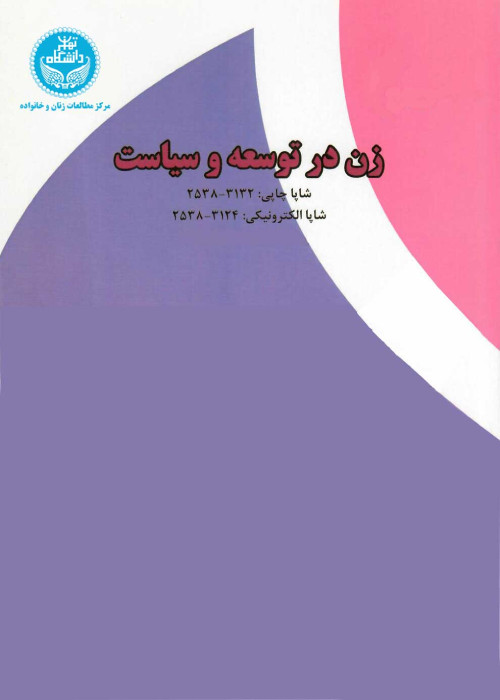A study on predicting factors of violence against women (Case study: women who refer to court)
Author(s):
Khosravi , Zohreh , Khaghani Fard , Mitra
Abstract:
World Health Organization (WHO) considers familial violence as a universal phenomenon; even the most developed countries suffer from it and thus domestic violence against women is associated with negative social and mental consequences. According to the literature, level of education and perceived social support are associated with violence against women. Therefore, this research aims to study the violence against women in relation to social support and socialization. It investigates predicting factors of violence against women among women, who refer to court. The study has a control group to compare their data with that of case study. The sample data are drawn from women residing in Tehran. Good's resource theory (1971)-one of the theories related to domestic violence- states that family is similar to any social system or unit as it is a power based system. Therefore, the women who have economic, working and educational power and social support are less exposed to the violence from their husbands. Gender socialization and role tendencies theory state that the roles of men and women are in favor of women being abused. Socialization accompanied with observing and experiencing domestic violence, result in using violence in the family. Traditional gender role attitudes associated with the female as subordinate to male power can place them at higher risk for being abused by their spouse (Firestone, Harris and Vega, 2003). The sample study consists of 184 harassed women who referred to Family Court and affiliated institutions as well as 228 women with the same age and length of marriage who have not referred to above mentioned institutions and constitute the control group. The research makes use of Violence assessment Questionnaire in order to assess physical, mental, sexual and economic violence separately. This questionnaire includes 32 items which is based on likert scale (this questionnaire was developed based on Hj-Yahia, 1999 and Khosravi & Khaghani, 2005). Gender Role Socialization Questionnaire that assesses the type of socialization is also used in the study. It involves 12 items which is based on likert scale (This questionnaire was developed based on Gender role socialization theory). Another instrument is Social Support Questionnaire to assess real and perceived social support which includes 4 items based on likert scale (this questionnaire was based on khosravi and khaghani' work, 2005). The results show that the women who referred to court have lower level of education and occupation than the control group. Women who referred to court obtained higher score in physical, mental, sexual and economic violence than the control group. Control group has more social support, occupational and educational resources than women who referred to the court. Control group are less socially passive than the group who referred to the court. Furthermore the results of regression analysis indicate that socialization, social support and social capital significantly predict the amount of violence against women.
Keywords:
Language:
Persian
Published:
Women in Development and Politics, Volume:8 Issue: 3, 2010
Page:
177
magiran.com/p790464
دانلود و مطالعه متن این مقاله با یکی از روشهای زیر امکان پذیر است:
اشتراک شخصی
با عضویت و پرداخت آنلاین حق اشتراک یکساله به مبلغ 1,390,000ريال میتوانید 70 عنوان مطلب دانلود کنید!
اشتراک سازمانی
به کتابخانه دانشگاه یا محل کار خود پیشنهاد کنید تا اشتراک سازمانی این پایگاه را برای دسترسی نامحدود همه کاربران به متن مطالب تهیه نمایند!
توجه!
- حق عضویت دریافتی صرف حمایت از نشریات عضو و نگهداری، تکمیل و توسعه مگیران میشود.
- پرداخت حق اشتراک و دانلود مقالات اجازه بازنشر آن در سایر رسانههای چاپی و دیجیتال را به کاربر نمیدهد.
In order to view content subscription is required
Personal subscription
Subscribe magiran.com for 70 € euros via PayPal and download 70 articles during a year.
Organization subscription
Please contact us to subscribe your university or library for unlimited access!


